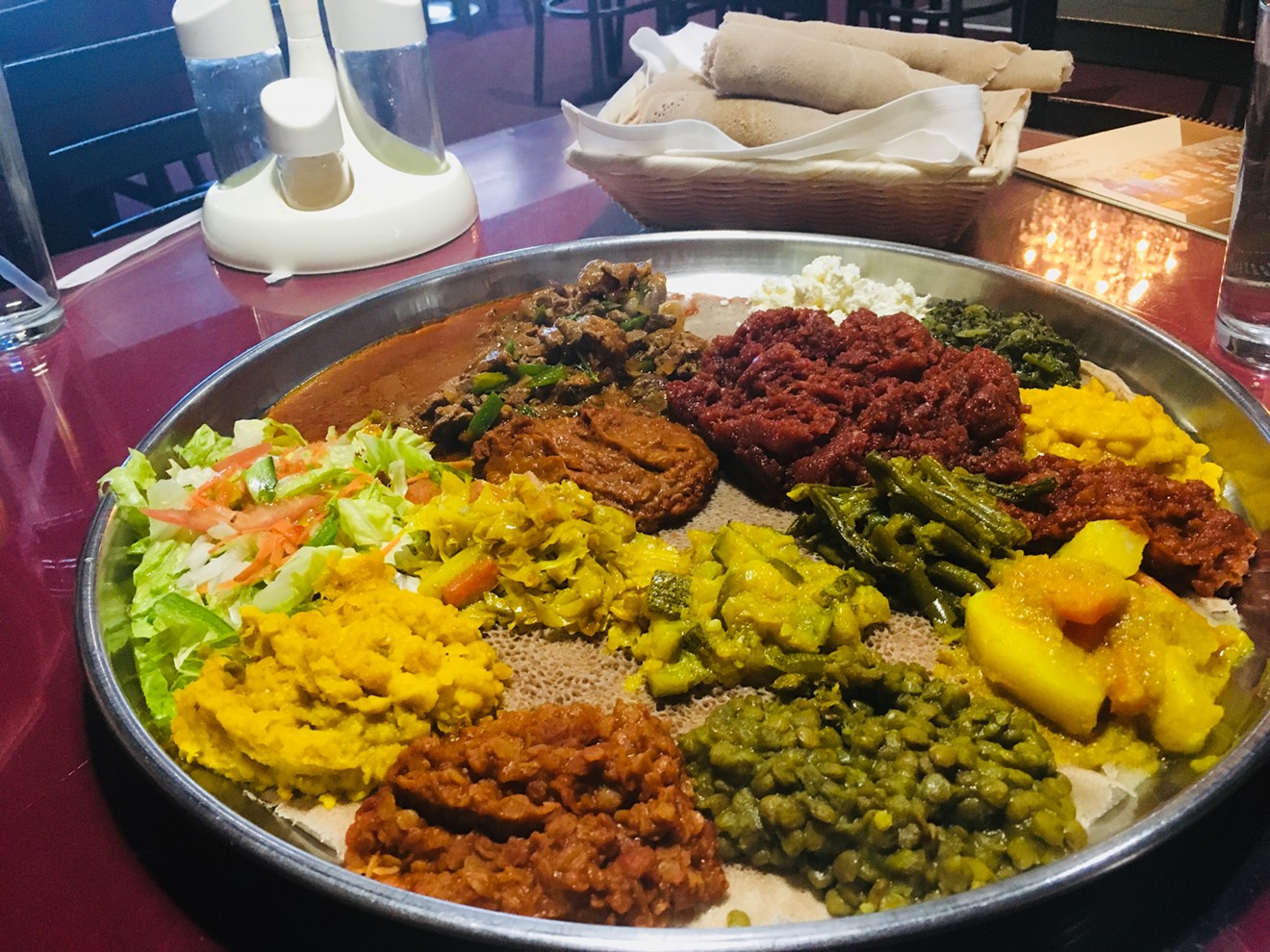Traditional basket-style tables (called mesobs) dot the dining room, and beautiful art featuring the people of Ethiopia hangs on the walls. The smells of turmeric, cumin and cooking meats permeate the room, foreshadowing the lavish, authentic meal that awaits you. One visit is enough to observe that the Nile has become a gathering place for all: vegetarians, Ethiopian-food virgins, marrow-sucking carnivores and Ethiopian natives looking for a taste of home. This was to be only my second time experiencing the cuisine, so I fall in the (almost) Ethiopian-food-virgin category. Because of that — and hoping to avoid looking like a complete ignoramus — I did a little research on how to eat the food and what kind of foods would be served.
It is traditional in Ethiopia to eat with your right hand only — somewhat difficult to do if you’re a left-hander like me, but worth the attempt nonetheless. I saw many people in the restaurant eating with their right hand, so give it a shot if you want to do as the Ethiopians do. Start with an order of sambusas ($1.50-$2 apiece), which come with a choice of lentil, spinach or beef filling — and are easy to eat with one hand. I was a little disappointed to find that the shells of the sambusas were made with a wonton wrapper rather than being created from scratch, but the crackling crust was still a delicious housing for the onion-imbued spinach filling.

Like many other Havana Street eateries, the Nile isn't much to look at from the outside.
Maureen Witten
If you’re going to eat as the Ethiopians do, an order of one of Ethiopia’s most popular beef dishes, kitfo ($13.99), is a must. Similar to tartare, the meat is chopped finely until the texture resembles that of ground beef; it's then mixed with spiced ghee and served raw with the restaurant's housemade cottage cheese and cooked spinach. If you’re squeamish about raw beef, you can have the kitfo cooked to a temperature of your liking. I went with raw, and was rewarded with a fresh, buttery beef flavor that was unlike anything I’d had before.
Orthodox Christians make up almost half of the Ethiopian population, and it is customary for them to fast every Wednesday and Friday, as well as the entire forty days of Lent. Fasting in this case does not mean abstaining from eating altogether, but refraining from meat and animal products. Having to eat a mandatory vegetarian diet for nearly half the year, Ethiopians have found a way to make lentils and legumes taste amazing, which is why I was excited to learn that the Nile serves a vegetarian combo platter ($12.99) that includes an assortment of thick yellow and red lentil stews along with several different vegetable salads — all served atop a layer of injera — to calm your tastebuds between spicy bites. How they made these little grains taste so meaty and powerful is still a mystery to me, but I wouldn’t miss meat that much if I had these to eat at every meal.
The tender lamb tibs fir-fir ($13.99), though, were probably the actual culprit for the meat-induced glow on my forehead. Brought out in its own dish and then dumped onto our vegetarian combo tray, the chunks of lamb, fragrant with green pepper and rosemary, nearly overshadowed its turmeric-imbued lentil counterpart, but when scooped up together in a piece of injera, the union of meat, veggie and lentil proved even better than the individual parts. Slurp-worthy, marrow-filled bones accompany the lamb tibs, and with the level of decadence and quality of the protein, the experience is comparable to that of a fancy steakhouse.
The people at the table next to me had brought in Happy Meals for their kids to eat while they dined on their platter of carefully prepared meats and lentils, but the staff didn’t seem to mind, and the couple enjoyed their lunch in peace while the kids quickly polished off their chicken nuggets and ran away to play on the stage area atthe front of the eatery. The servers and patrons weren’t even fazed when the kids began playing somewhat noisily while the parents sat at the table and savored their meal. It seemed like a normal occurrence, like one big informal family gathering, an example of the underlying vibe of family and community that fills the restaurant, with groups of men having coffee in the corner, parents and children sharing food together and servers gathered at the bar noisily chatting among themselves between checking in on customers.
What I respected most about the Nile's traditional approach to Ethiopian cuisine and culture is that food is not just viewed as physical nourishment for the body, but nourishment for the mind and soul, too. Meals are an important event, meant to be shared with people you love. When you order a dish off the menu, it’s not just your dish, it’s fair game for everyone at your table. All the food served is communally (among your group, that is — not between tables), so make sure you go with people you like, and be ready to share what you order with them. Bonus points if you lovingly feed your dining companion bites of food — another customary way to eat Ethiopian fare.
The Nile's menu is broad enough to appeal to those seeking African cuisine, vegetarians, families with kids in tow, meat lovers tired of the typical steakhouse experience — or, best of all, a group of all of the above sharing food served on the same massive piece of injera (chicken nuggets not included).
Nile Ethiopian Restaurant is located at 1951 South Havana Street, Aurora, and is open from 11 a.m. to 2 a.m. daily. Call 720-748-0239 or visit the Nile website for more information.














